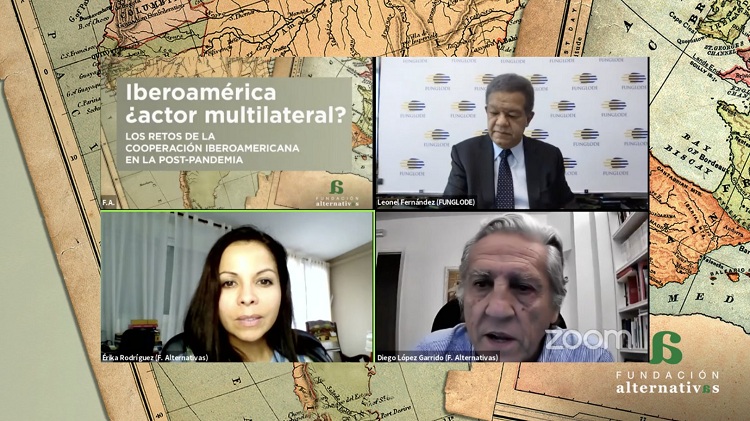The Diplomat
Former Dominican President Leonel Fernández has warned that Ibero-America needs “a joint and coordinated response” to the “economic and social crisis” caused by the pandemic, whose recovery may be complicated by the “decrease in tax revenues” and the looming “energy crisis”, with the consequent “destabilizing social and political repercussions”.
Fernández made these statements during his participation in the online debate Iberoamerica, multilateral actor? The challenges of Ibero-American cooperation in the post-pandemic, organized last Thursday by the Alternativas Foundation on the occasion of the launch of the Report Ibero-America 2021: The Ibero-American system and multilateralism: a perspective of progress. The meeting was moderated by Érika Rodríguez, coordinator of the Latin America Area of Alternativas.
“Ibero-America needs a joint and coordinated response, since it is not only a health crisis, but also an economic and social crisis,” declared Leonel Fernández, president of the Global Foundation for Democracy and Development (FUNGLODE, founded by himself in 2000, at the end of his first presidential term) and president of the Dominican Republic for three terms (1996-2000, 2004-2008 and 2008-2012).
According to the former president, all governments have “reacted” to the pandemic by increasing public spending – in contrast to the austerity policies of the 2008 crisis – but in a context of “declining tax revenues”, with the consequent “increase in debt”. This “global concern” has been addressed with “tax reforms” and taxing “progressively” those who have more, but in the Dominican Republic, and in the Caribbean in general, the adoption of progressive taxation is “more difficult” because of its economic structure, especially in the tourism and real estate sectors, where “certain exemptions” are “necessary” for investment.
The only tax reform to “generate the resources” to maintain public spending and “reactivate growth” in the post-pandemic stage has to be “taxing consumption”, but it would be a tax reform of a “regressive nature” that would affect the “middle class and the most vulnerable sectors of society”, he continued. For this reason, he added, “a new global financial architecture must be created to provide Ibero-American middle-income countries with sufficient resources to reactivate and recover economic growth”.
“The increase in the price of oil and the scarcity of natural gas and coal are leading us to an energy crisis as a consequence of the inflation we are already experiencing, and if we add to this the collapse of global value chains and the increase in freight and maritime insurance payments, we find ourselves in an inflationary crisis, to which if we add a tax reform that affects the middle class, it will have destabilizing social and political repercussions for the Latin American region,” said Fernández.
For his part, Vicente Palacio, director of Foreign Policy of the Alternativas Foundation, stated during the debate that “the COVID-19 war is being very bad, but post-wars are sometimes worse, and Latin America does not have tools for recovery like the EU, which has a Central Bank, recovery funds or pooled debt”.
Likewise, the executive vice-president of Alternativas Foundation, Diego López Garrido, warned that “the three most important issues in Latin America are health, the economy and politics” and added that, “at this time, there is an opportunity for it to achieve an economic integration that it has not achieved so far”. We have to consider how to collaborate at this juncture”, he added.







